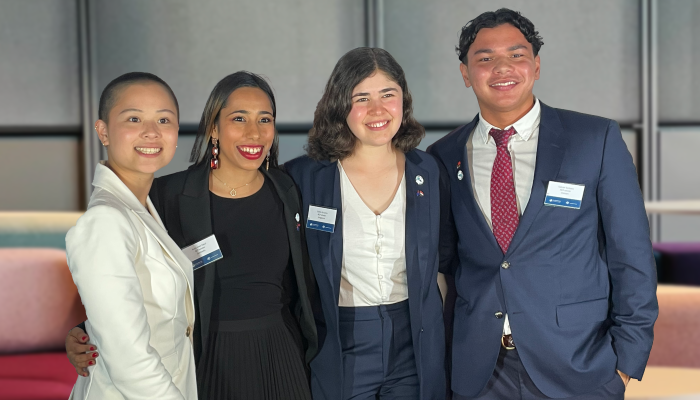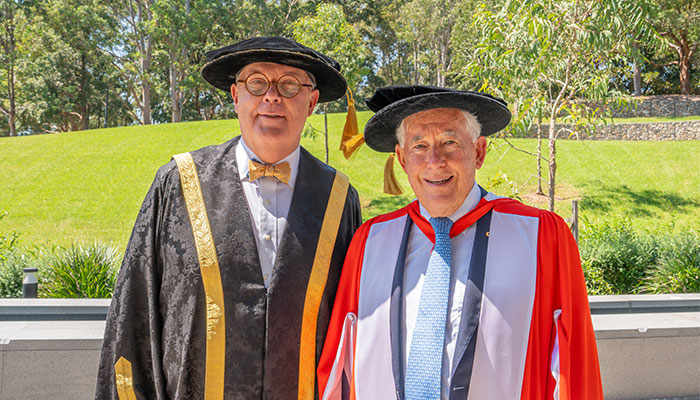Jessa Rogers, a Lecturer at Macquarie University's Department of Indigenous Studies, started her education career as a creative arts primary school teacher in Brisbane. From this role she saw how Indigenous students were missing out on cultural education and support, and decided to focus on Indigenous education.
Jessa belongs to the very small pool of Australia's Indigenous educators. In her article for The Guardian, Jessa noted that Indigenous teachers form only 1% of the teaching community, while Indigenous students make up 5% of the student population.
She says, "It has been clear for a number of years that programs aimed at increasing the number of Aboriginal and Torres Strait Islander educators are badly needed. It's an absolute need as all Australians are lacking knowledge about Aboriginal and Torres Strait Islander people, me included. We can start with teachers in schools"
"Having more Indigenous teachers is a key factor in fostering student engagement and improving educational outcomes for Indigenous and non-Indigenous students," added Jessa.
Jessa has been involved in MATSITI (More Aboriginal and Torres Strait Islander Teachers Initiative), a four-year program to increase the number of Aboriginal and Torres Strait Islander people entering and remaining in professional teaching positions in Australian schools. Now in its final year, MATSITI had been developing strategies that enhance the professional and leadership capabilities of Aboriginal and Torres Strait Islander teachers.
Indigenous Education at Macquarie
At Macquarie, Jessa rewrote and teaches the INED802 Contemporary Issues in Indigenous Education unit which is studied within the Master of Indigenous Education program. The INED802 unit enables students to examine ways educators can form essential connections with Indigenous parents, guardians, families and communities, and to look at ways in which Aboriginal and Torres Strait Islander histories, peoples and cultures can be woven through curriculum.
"Looking at the Australian Curriculum CCP and AITSL Professional Teaching Standards 1.4 and 2.4, this [unit] focuses on the practical aspects of Indigenous education that teachers and educators can implement, and the ways in which they can go about embedding Indigenous perspectives in meaningful ways," says Jessa. "This is important as many teachers working in schools are underprepared to meet these standards."
Macquarie is the only university in Australia to offer a masters degree in Indigenous Education. This program provides students the skills and knowledge required to provide a culturally appropriate education to Indigenous Australian students, as well as teach non-Indigenous students about Indigenous issues, people and culture.
The Master of Indigenous Education, Jessa explains, is a great starting point toward a career in Indigenous and policy making.
"We have a lot of Indigenous educators taking this course and [many of them] currently work with Indigenous students. This makes learning real because students are sharing real-life examples and using these for their assessment which is structured to be relevant and useful to their teaching/learning contexts."
By learning about the policies, practices and issues relating to Indigenous education, students of Master of Indigenous Education are empowered to help close the gap between the educational outcomes of Indigenous students and other students.
Jessa says, "It is essential to start Indigenous studies courses with reflection on how your own worldview was created, your own cultural ways of viewing the world, and consideration of how your own worldview impacts teaching and learning, for Indigenous and non-Indigenous teachers and students of all levels in schools and universities."
"I have devoted myself to education because our people deserve better. Our kids deserve culturally relevant schooling, and they deserve true opportunities to show their excellence. Our youth are amazing, and if I can play a small part in improving their lives and futures, I'll be happy with that."
Jessa Rogers is a Wiradjuri woman, Naidoc committee member, and Reconciliation scholar at ANU. She is currently undertaking PhD focusing on Indigenous research. She is developing an Indigenous research method termed Photoyarn which incorporates student photographs to lead the yarning circles in the research process.
Jessa belongs to the very small pool of Australia's Indigenous educators. In her article for The Guardian, Jessa noted that Indigenous teachers form only 1% of the teaching community, while Indigenous students make up 5% of the student population.
She says, "It has been clear for a number of years that programs aimed at increasing the number of Aboriginal and Torres Strait Islander educators are badly needed. It's an absolute need as all Australians are lacking knowledge about Aboriginal and Torres Strait Islander people, me included. We can start with teachers in schools"
"Having more Indigenous teachers is a key factor in fostering student engagement and improving educational outcomes for Indigenous and non-Indigenous students," added Jessa.
Jessa has been involved in MATSITI (More Aboriginal and Torres Strait Islander Teachers Initiative), a four-year program to increase the number of Aboriginal and Torres Strait Islander people entering and remaining in professional teaching positions in Australian schools. Now in its final year, MATSITI had been developing strategies that enhance the professional and leadership capabilities of Aboriginal and Torres Strait Islander teachers.
Indigenous Education at Macquarie
At Macquarie, Jessa rewrote and teaches the INED802 Contemporary Issues in Indigenous Education unit which is studied within the Master of Indigenous Education program. The INED802 unit enables students to examine ways educators can form essential connections with Indigenous parents, guardians, families and communities, and to look at ways in which Aboriginal and Torres Strait Islander histories, peoples and cultures can be woven through curriculum.
"Looking at the Australian Curriculum CCP and AITSL Professional Teaching Standards 1.4 and 2.4, this [unit] focuses on the practical aspects of Indigenous education that teachers and educators can implement, and the ways in which they can go about embedding Indigenous perspectives in meaningful ways," says Jessa. "This is important as many teachers working in schools are underprepared to meet these standards."
Macquarie is the only university in Australia to offer a masters degree in Indigenous Education. This program provides students the skills and knowledge required to provide a culturally appropriate education to Indigenous Australian students, as well as teach non-Indigenous students about Indigenous issues, people and culture.
The Master of Indigenous Education, Jessa explains, is a great starting point toward a career in Indigenous and policy making.
"We have a lot of Indigenous educators taking this course and [many of them] currently work with Indigenous students. This makes learning real because students are sharing real-life examples and using these for their assessment which is structured to be relevant and useful to their teaching/learning contexts."
By learning about the policies, practices and issues relating to Indigenous education, students of Master of Indigenous Education are empowered to help close the gap between the educational outcomes of Indigenous students and other students.
Jessa says, "It is essential to start Indigenous studies courses with reflection on how your own worldview was created, your own cultural ways of viewing the world, and consideration of how your own worldview impacts teaching and learning, for Indigenous and non-Indigenous teachers and students of all levels in schools and universities."
"I have devoted myself to education because our people deserve better. Our kids deserve culturally relevant schooling, and they deserve true opportunities to show their excellence. Our youth are amazing, and if I can play a small part in improving their lives and futures, I'll be happy with that."
Jessa Rogers is a Wiradjuri woman, Naidoc committee member, and Reconciliation scholar at ANU. She is currently undertaking PhD focusing on Indigenous research. She is developing an Indigenous research method termed Photoyarn which incorporates student photographs to lead the yarning circles in the research process.



